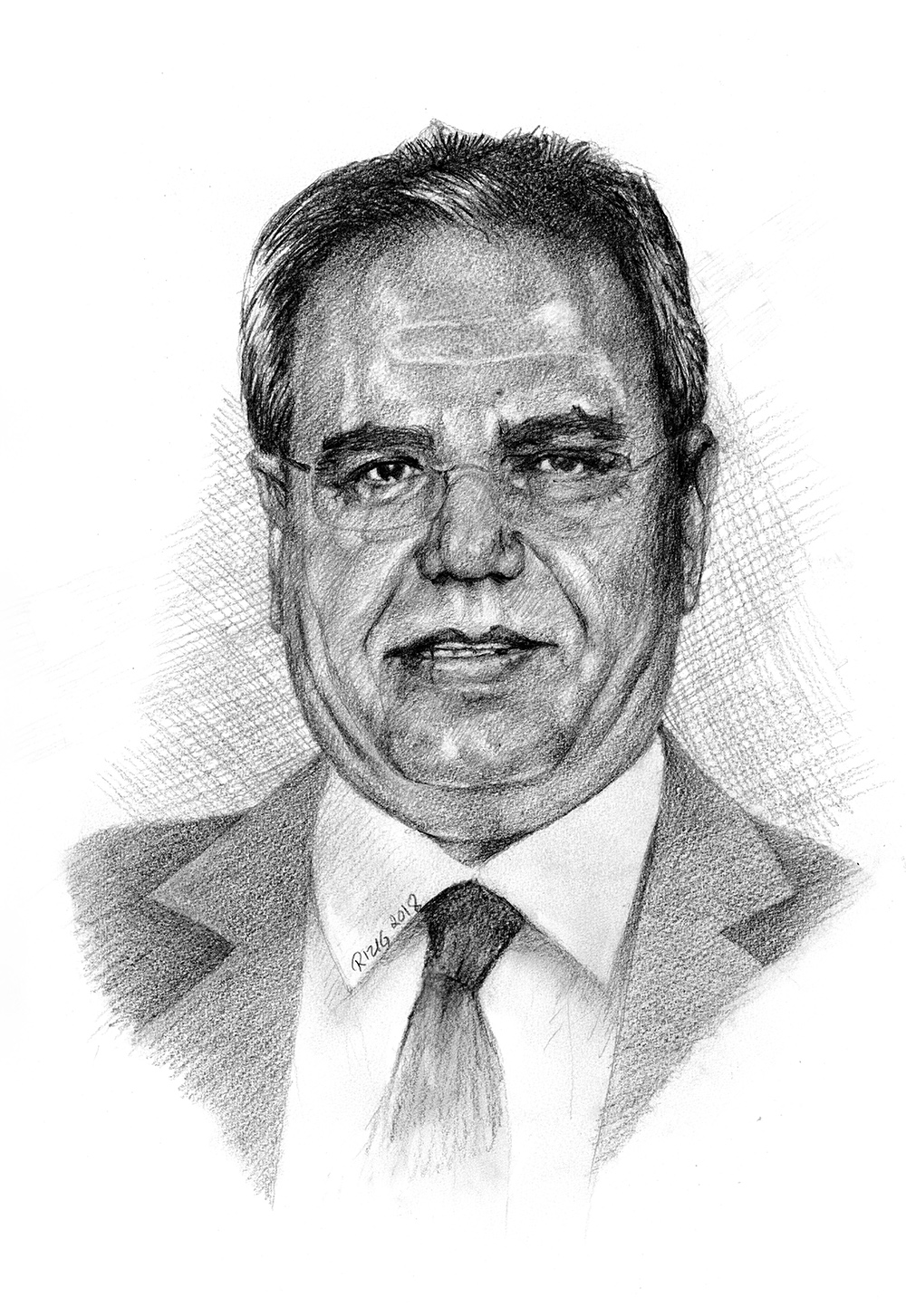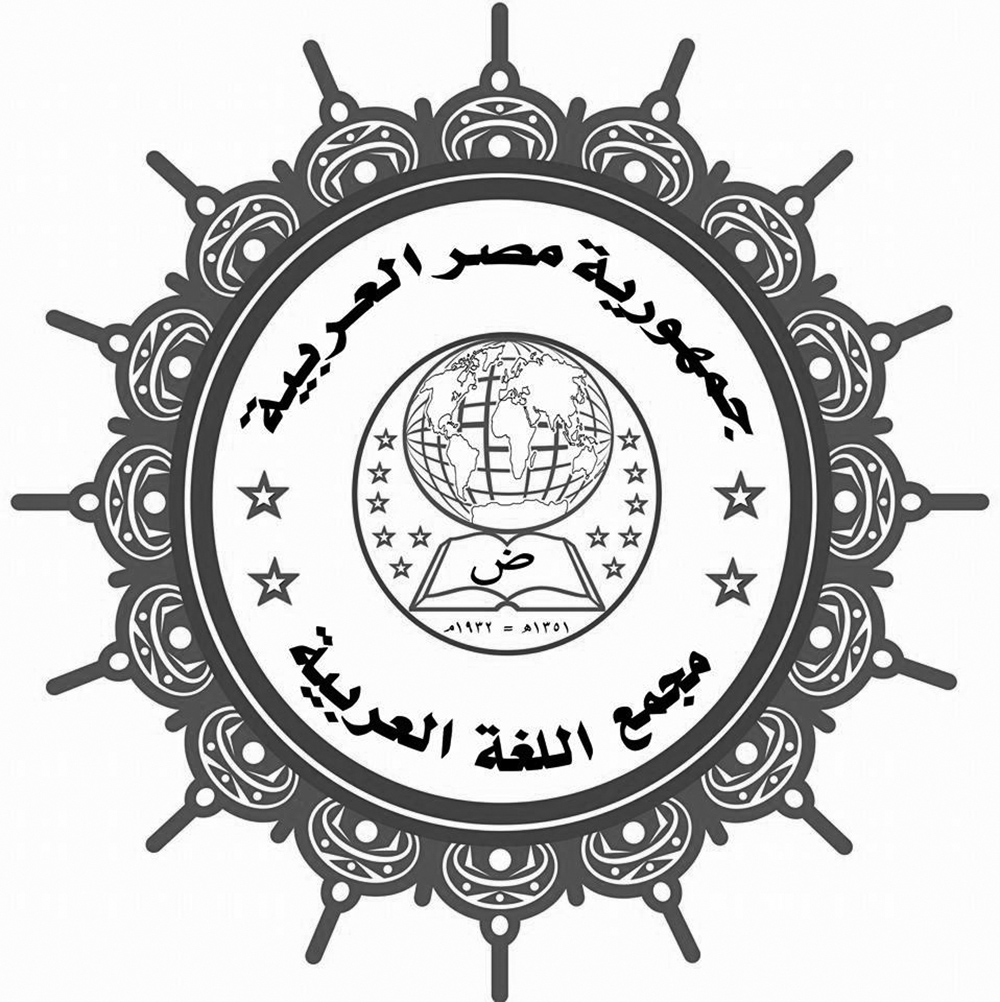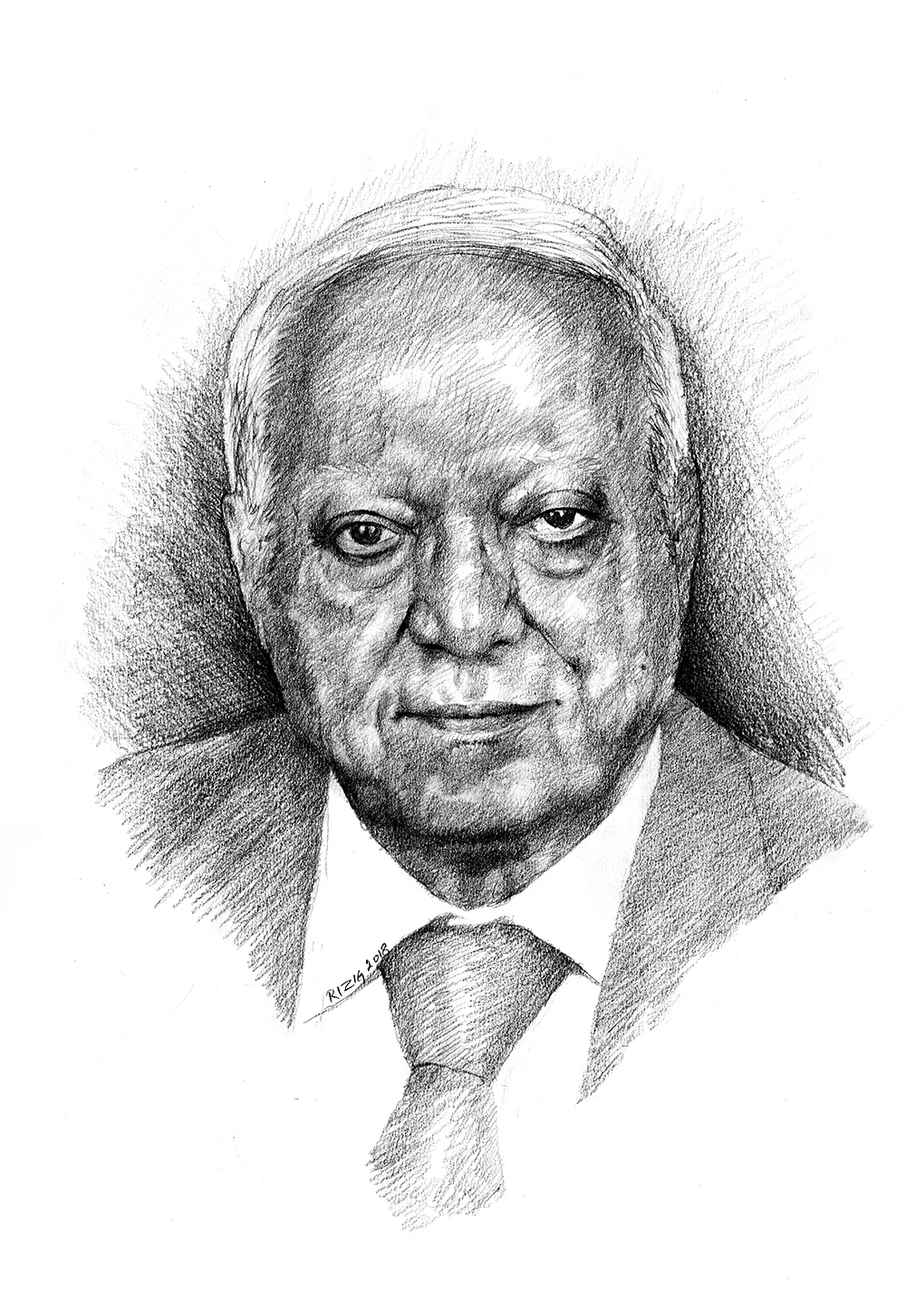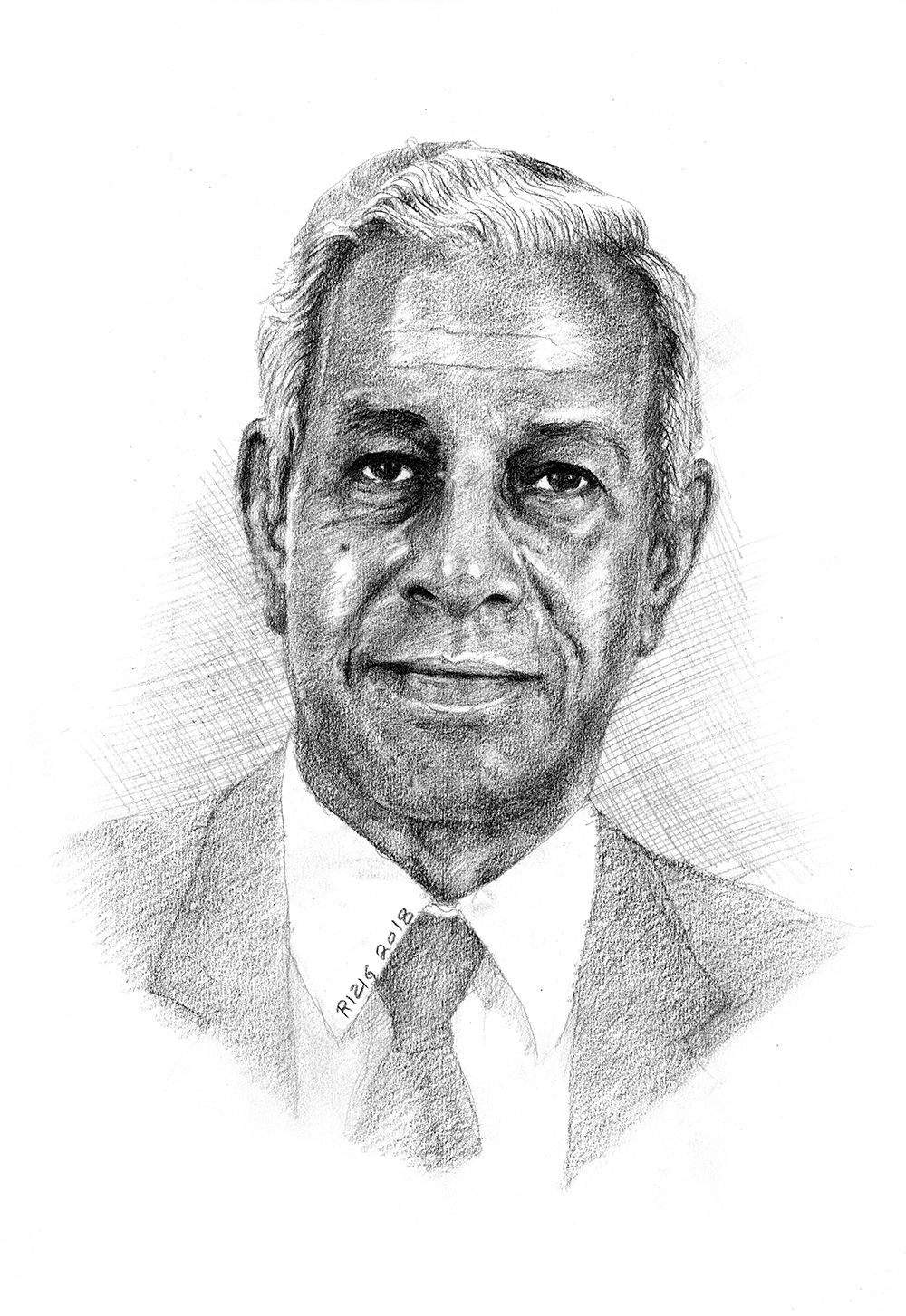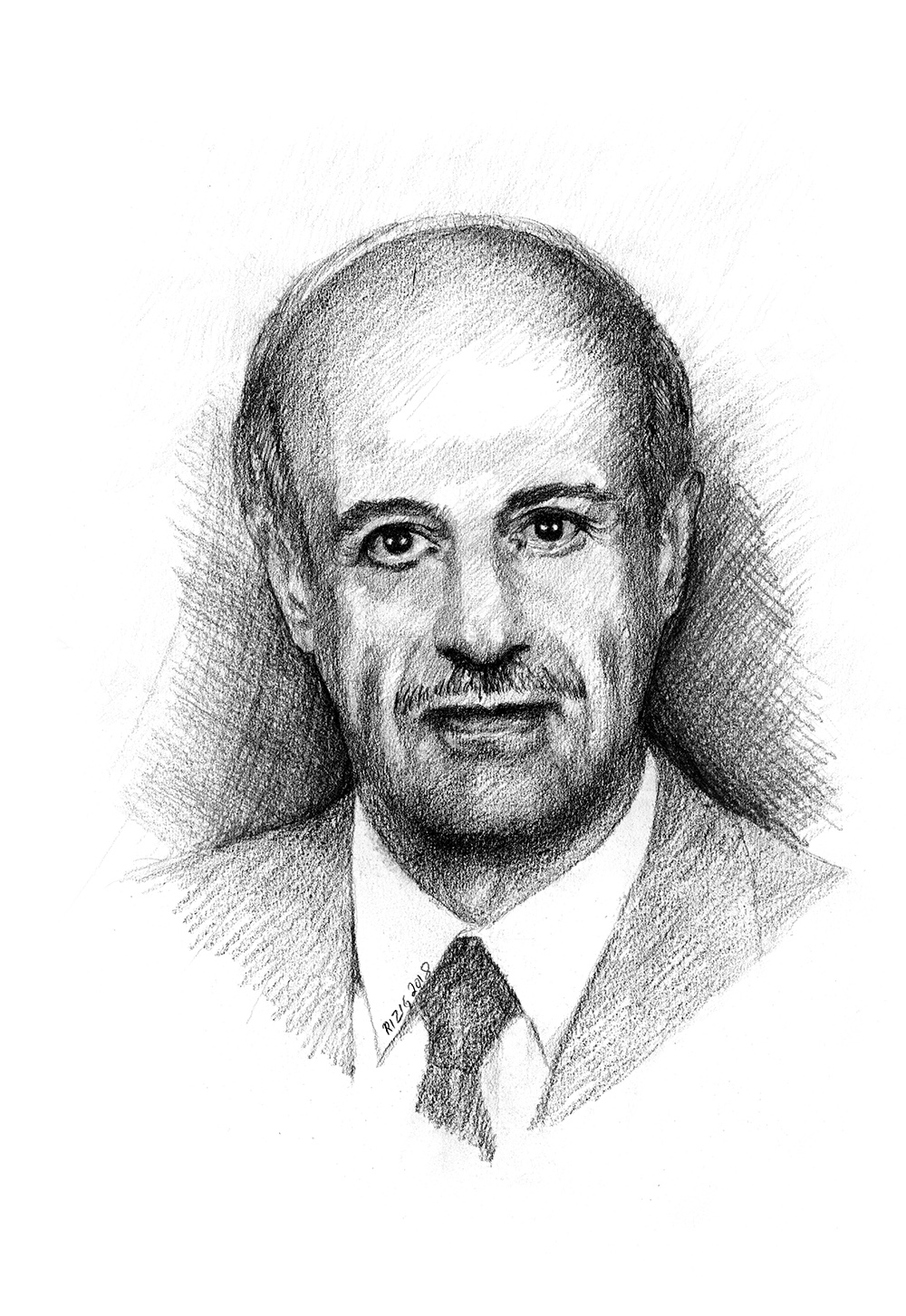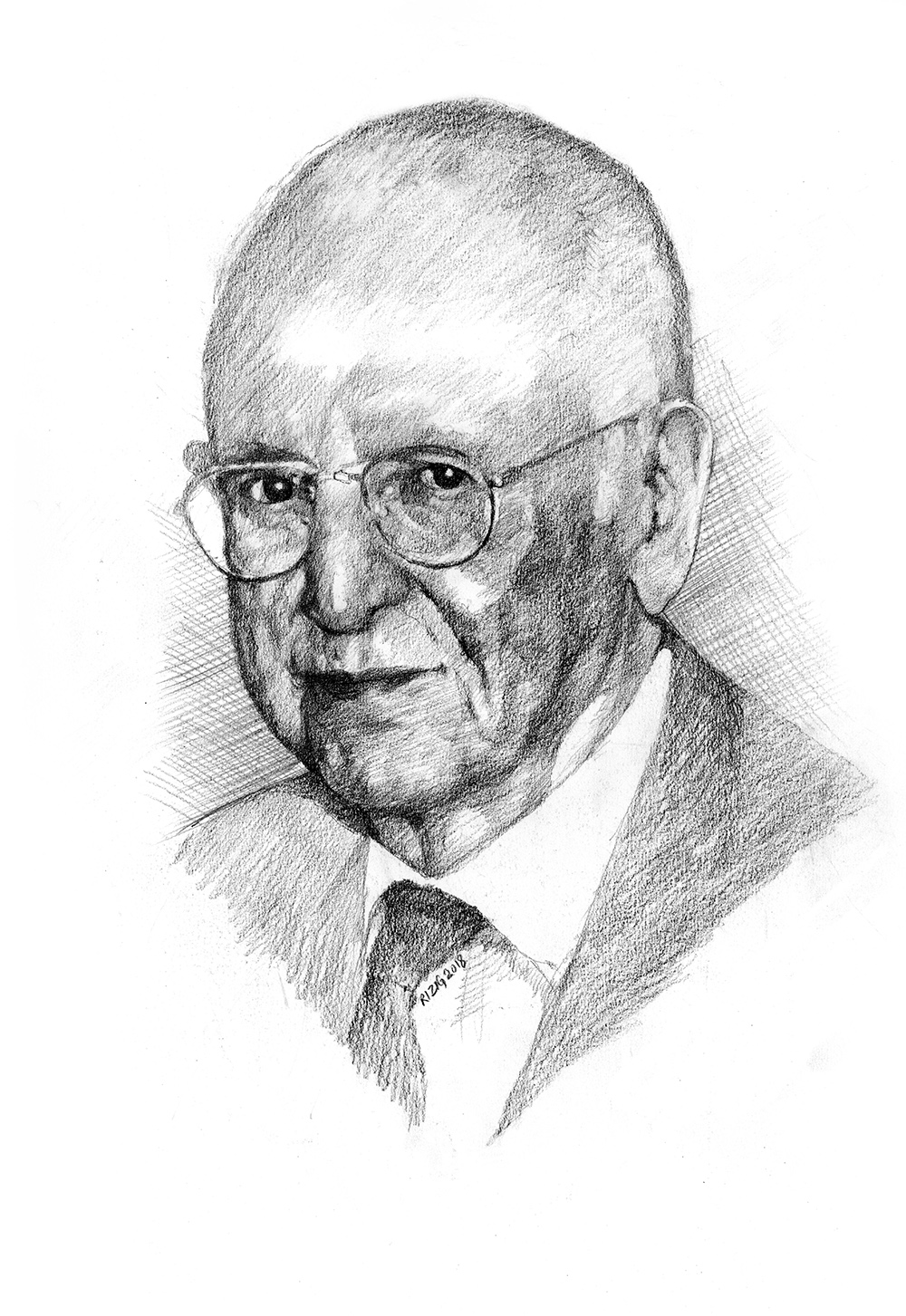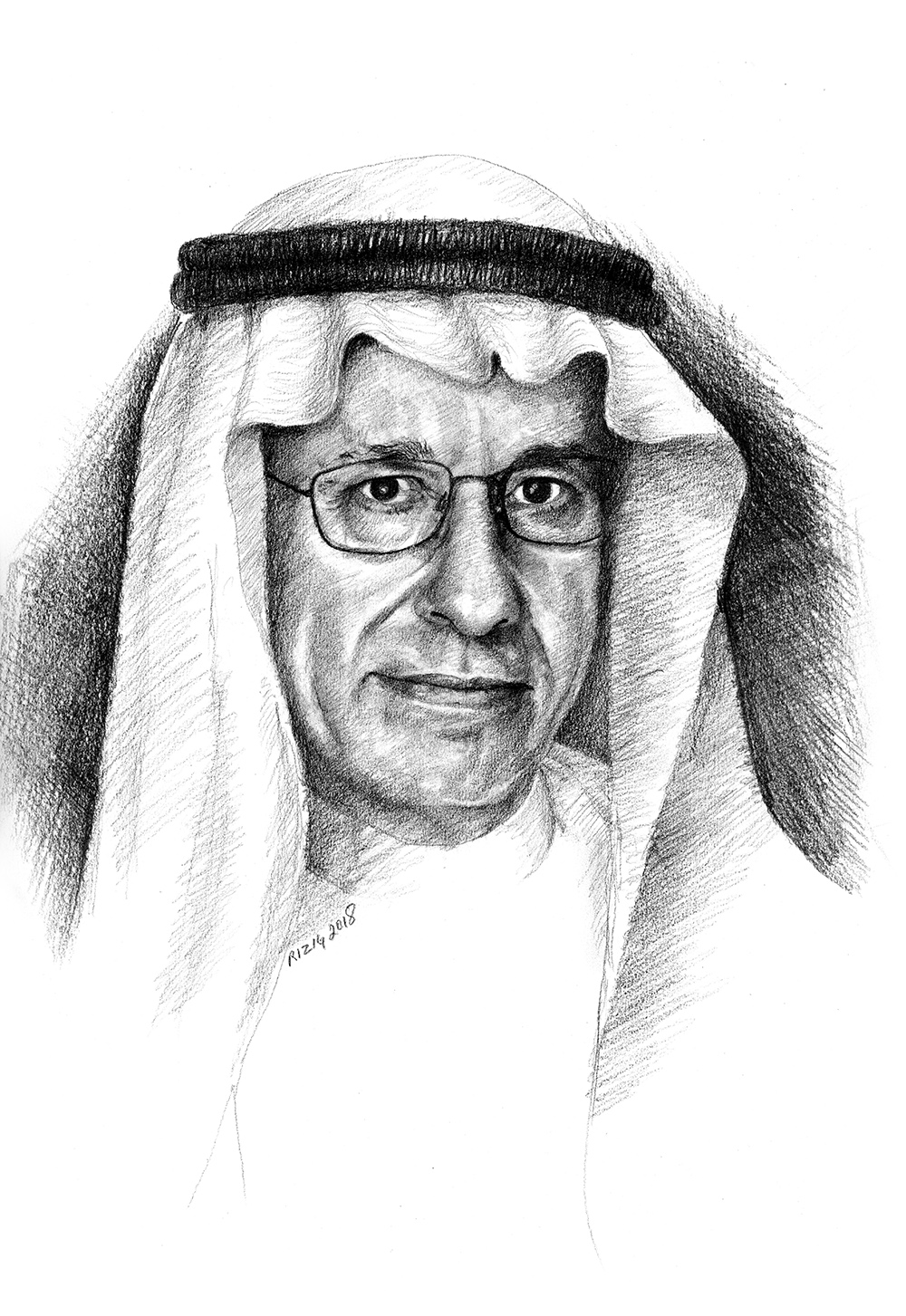The 1987G (1407H) King Faisal International Prize for Arabic Language and Literature (Topic: Literary Studies on Modern Arabic Prose) has been withheld due to the lack of sufficiently meritorious nominations.
(Withheld)
The 1985G (1405H) King Faisal International Prize for Arabic Language and Literature (Topic: Studies on Ancient Arabic Literary Criticism) has been withheld due to the lack of sufficiently meritorious nominations.
(Withheld)
The 1979G (1399H) King Faisal International Prize for Arabic Language and Literature (Topic: Studies on Contemporary Arabic Poetry) has been withheld due to the lack of sufficiently meritorious nominations.
Dr. Abdullah Ibrahim
Abdullah Ibrahim obtained his Bachelor of Arts’ degree in Arabic Language and Literature from the College of Education, Baghdad University, in 1981, followed by a Masters’ degree in Arabic Literature (Novel) in 1987, and a Ph.D. in Arabic Literature (Discourse) from the College of Arts, Baghdad University, in 1991. Between 1991-2003, he lectured in a number of Arab Universities, teaching Arabic Literature and Literary Criticism in Al-Mustansiriya University in Baghdad from 1992-1993, the 7th of April University in Libya from 1993-1999 and Qatar University from 1999-2003. He also taught courses on research methodology in literary studies and discourse theory and its applications to postgraduate students in Iraq and Libya. In 2003, he was appointed by the Ministry of Culture in Qatar as coordinator for Qatar’s International Prize. As of 2010, he became Cultural Advisor in the Emir’s Court in Qatar.
Dr. Abdullah Ibrahim’s erudition and deep knowledge of the Arabic narrative and world literary arts have earned him recognition as a leading scholar of Arabic Literary criticism and a pioneer of modern Arabic novel discourse. He has authored more than 20 books and co-authored 10 others, as well as numerous scholarly and general articles, dealing with different aspects of the Arabic novel exposition. In his studies, he was able to refine and deeply analyze the modern Arabic discourse entry and to elucidate the relationship between Arabic narrative and mainstream narrative in world literature. He combined research on Arabic narrative with different cultural trends, and established a solid and broad base for his studies on Arabic literary criticism. Dr. Ibrahim participated in numerous national and international conferences and seminars in his field of specialization. In 1997, he was awarded Shoman’s Prize for Young Arab Researchers, and in 2013, he was awarded Shaikh Zayed’s Book Prize for Literary Studies. He is also a contributing researcher for Cambridge Encyclopedia of the History of Arabic Literature.
This biography was written in the year the prize was awarded.
Arabic Language Academy In Cairo
Arabic language advocates in Egypt strived for many decades to create an Arabic Language Academy that would advance Arabic, preserve its heritage and explore new horizons for its progress and modernization. The first attempts to establish the academy date back to the latter part of the 19th Century, A.D., but did not last long despite repeated attempts to revive it. The dream of Egyptian intellectuals and literati came true when a Royal Decree was issued on December 13, 1932, endorsing the establishment of an Arabic Language Academy in Cairo to maintain the integrity of the Arabic language, fulfill the needs of sciences, arts and modern civilization, produce comprehensive linguistic and historical dictionaries, study modern Arabic dialects in Egypt and other Arab countries, publish a journal of linguistic research and verify the riches of Arabic cultural heritage.
The Academy was formed of an elite international group of Arabic language scholars renowned for their profundity and deep knowledge of Arabic language, grammar, dialects and terminology. They comprised Egyptian and non-Egyptian scholars and Arabists, including honorary and corresponding members. The Academy issued several resolutions with far-reaching impact on the development of scientific terminology, Arabization, phonetics, enunciation and morphology of the Arabic language. In this manner, it was possible for the Arabic language to readily accommodate life sciences, modern civilization, applied sciences and technology.
The Academy’s contributions to linguistics and Arabization of literature and science continued and advanced progressively in many fields, while its resolutions were revised and reorganized as necessary, The Academy became fully autonomous, with specific objectives and procedures and with a 40 members office and several specialized committees, experts and editors.
The Academy holds an annual conference during which its members, including corresponding members from abroad, review the works of the Academy’s committees as well as the members research, studies and lectures on a wide range of important subjects in linguistics, sciences, literature and arts, facilitation of grammar, Arabic writing, scientific and media languages, classical, colloquial and modern Arabic, in addition to Arabic scientific terminology and heritage. The conference resolutions and recommendations are conveyed to other Arabic language academies, universities and relevant ministries in the Arab world.
The Academy also established a library holding more than 40,000 titles in different fields of knowledge, Arabic language, literature, ancient and modern sciences and applied arts, in addition to a wealth of rare ancient manuscripts (original or microfiche copies), encyclopedias and hundreds of classic texts and references dealing with interpretation (of the Holy Quran, Quranic studies, Hadith (Prophet Mohammed’s sayings), fiqh (Islamic jurisprudence), philosophy and logic. The library’s contents are carefully cataloged and stored in computerized databases. The library also contains a register of more than 170,000 terms classified into 37 different categories of knowledge. All translated terminologies of arts and sciences approved by the Academy’s committees and conferences are recorded in compact discs and distributed to other Arabic language academies, cultural institutions and the media throughout the Arab world.
The Academy also publishes a bi-annual journal of which more than a hundred issues have so far been published. Besides, it publishes its conference proceedings. books and papers in different fields of research.
In addition to these major contributions, the Cairo Arabic Language Academy has produced, in collaboration with many experts over the past 80 years, a large collection of general and specialized Arabic Language dictionaries, including the Grand Dictionary, the Intermediate Dictionary, the Concise Dictionary and the Dictionary of Quranic expressions. These illustrious dictionaries cover linguistics, literature, grammar, eloquence, morphology, philosophy, history, geography, psychology, life sciences, arts, medicine, mathematics and civilization. They are characterized not only by their diversity and fulfillment of the needs of different Arabic language users but also by linking contemporary Arabic language with its past and by utilizing modern techniques and methodologies in dictionary production.
This biography was written in the year the prize was awarded.
Professor Nabil Ali Mohamed
Nabil Mohammed received his B.Sc., M.Sc. and Ph.D. degrees in Aeronautical Engineering from the Faculty of Engineering at Cairo University. He started his professional career in 1960 as an aeronautical engineer in the Egyptian Air Force, and 12 years later, he joined Egypt Air as Data Processing Manager, where he established the first Airline Reservation System in the Arab region. From 1976 onward, he held a number of senior positions in computer applications and development in Egypt and overseas. He became Group Vice-President for Operations in the Pan Arab Computer Center in Kuwait city, Vice-President for Research and Development (R&D) in World Electronics in Athens, Greece, Consultant to Egypt-Air Chairman for information processing and operational research. Between 1981-1983, he was contracted by Georgia Institute of Technology to manage the USAID Project for establishing the Egyptian Network for Scientific and Technological Information (STI) in Cairo. For the following three years, Professor Nabil Ali was appointed Project Manager, launching Sakhr Computers and Arabic Software Company in Kuwait, and subsequently became Vice-Chairman for R&D in Sakhr Software, Cairo, then Director of Advanced Multilingual Systems (AMLS) in Cairo, specializing in Arabic Language technologies. He was a Corporate Consultant for Advanced Arabic Systems in Cairo.
Professor Nabil Ali’s pioneering contributions in the field of Arabic computational linguistics include the development of an Arabic morphological processor (analyser/synthesizer), Arabic automatic parser and Arabic diacritizer capable of automatically generating vowels. He has also developed numerous programs in the field of edu-ware and culture-ware (Arabic and bilingual) including the first Holy Quran software. Furthermore, he developed a lexical database for Arabic, using a multi-level hierarchy of semantic features, designed and developed a prototype language laboratory for teaching Arabic using information and communication technology and designed the first knowledge-based prototype for Arabic poetry.
Professor Ali also served as a part-time lecturer in the Faculty of Engineering at Cairo University, and the American University in Cairo, and was Visiting Scholar for one year at the Linguistics Department, University of California in Los Angeles, USA. He supervised post-graduate students in the fields of Arabic computational linguistics at the National Research Center in Cairo and lexico-syntactic properties of Arabic verbs in Dar al-Uloum at Cairo University. He is a member of several national and international scientific and cultural organizations and former Vice-President of the Arabic Language Engineering Society. Professor Ali published several papers, books and technical reports. His deep knowledge and remarkable ability to analyze and present his findings in the form of practical programs that benefit scholars of both linguistics and computerization fields have earned him important awards, namely: the 1994 Best Book Award in Futuristic Studies, Cairo International Book Fair; 1996 Award of Excellence for developing the Arabic Linguistic Engine, Sakhr software (described by PC Middle and Near East as the most innovative Arabic Software of the year); 2003 Best Book Award in Information Age Challenges, Cairo International Book Fair, and 2007 Creativity Award in Information Technology by the Arab Thought Foundation, Lebanon.
This biography was written in the year the prize was awarded.
Professor Ali Helmy Ahmed Moussa
Ali Mousa received his bachelor’s degree (First Class Honors) in mathematics from Ain Shams University in Cairo in 1953, and Ph.D. in mathematical physics from London University in 1958. He was also awarded a D.Sc. degree from Ain Shams University.
Professor Mousa’s academic career span nearly 50 years during which he rose from the status of Lecturer in Applied Mathematics in 1959 to Professor of Mathematical Physics in 1973. Professor Mousa taught theoretical physics at Ain Shams and the American University in Cairo, Kuwait University, and King Abdulaziz University in Jeddah, Saudi Arabia. He mentored 16 doctoral students and was the Principal Investigator of a joint Ain Shams University and Stanford Research Institute Project on Applications of Modern Sensing Techniques in Egyptology, Principal Investigator in a UNESCO project entitled: Use of Visualization Techniques in Teaching Introductory Physics Courses in Arab Universities and leader of the computer group in a UNESCO project entitled Modernizing Physics and
Mathematics Education in Arab Universities. He was a Professor Emeritus of Physics in the College of Science at Ain Shams University.
Professor Mousa published around 70 papers and several books in physics and participated in numerous local, regional and international conferences and symposia. In addition to his research in physics, he is credited for having realized, since the 1970’s, the importance of computer applications in Arabic language studies. His significant contributions to the computerization of studies into the Arabic language roots have established him as a pioneer in this field. He published 5 books on the subject, in addition to studying Arabic words and consonant-vowel relations in the Holy Quran. His contributions in international meetings included many important studies such as: Entropy of Arabic Language, Compression of Arabic Text Via Arithmetic Coding, Corpus for Modern Standard Arabic: Preliminary Design and Analysis, Computer Applications in Linguistics and A Mathematical Model for the Automatic Prediction of Diacritics in Arabic Language: Algorithm of Model. He had also written several popular articles on the history and philosophy of science in Arabic.
Professor Mousa was the President of the International Association of Arabic Computing, Elected Fellow of the Institute of Physics (U.K.), Member of the Egyptian Arabic Language Academy, Egyptian Academy of Science, Egyptian Mathematical and Physical Society and Egyptian Mathematical Society. His contributions have been recognized by a number of awards, namely the Egyptian Amin Lutfi Award in Physics in 1964, the Egyptian State National Award in Physics in 1974, Egypt’s Presidential Award (First Class) in Sciences in 1976, and Arts and “Scientific Innovation Award” by the National (Ahli) Bank, Egypt in 2000.
This biography was written in the year the prize was awarded.
Professor Ramzi Mounir Baalbaki
Ramzi Baalbaki earned his BA with high distinction and Penrose Award in 1973 and an MA in Arabic Language and Literature in 1975 from the American University of Beirut (AUB), and a Ph.D. in Arabic Grammar and Comparative Semitics from the School of Oriental and African Studies at the University of London in 1978. During his academic career at AUB which spans over 30 years, he established himself as a distinguished teacher and scholar, particularly in the field of Arabic grammatical thought. He quickly progressed from Assistant Professor in 1978 to full Professor in 1989, and is currently the Margaret Weyerhaeuser Jewett Professor and Chairman of the Department of Arabic and Near Eastern Languages at AUB. He was Visiting Scholar at the Universities of Cambridge in 1988, Chicago in 1993 and Georgetown in 1998, and a scholar in residence at Georgetown University in 1999. He also served as Director of the Center for Arab and Middle East Studies from 1985 until 1990, and Associate Dean of the College of Arts and Sciences from 1997 until 2004 at AUB.
Professor Baalbaki is one of the most respected scholars of Arabic grammatical studies. He wrote several major books and about 60 scholarly articles and book chapters on this subject. He also produced critical editions of Arabic texts in grammar, biographical writing and lexicography. His books include: Al-Kitaba aAl-Arabiyya wa-l Samiyya: Dirasat fi Tarikh Al-Kitaba ind Al-samiyyin (Studies in Arabic and Semitic Epigraphy),(1981; 424 pp); Dictionary of Linguistic Terms: Arabic-English (1990; 806 pp); Fiqh aAl-Arabiyya aAl-Muqaran: Dirasat fi Aswat Al-Arabiyyia wa Sarfiha wa Nahwiha ala Daw’ Al-Lugat aAl-Samiyya (Comparative Arabic Philology: Studies in Arabic Phonology, Morphology and Syntax in the Light of Semitic Languages) (1999; 277 pp); Grammarians and Grammatical Theory in the Medieval Arabic Tradition (2004; 354 pp); and The Legacy of the Kitab: Sibawayhi’s Analytical Methods Within the Context of the Arabic Grammatical Theory (2008; 334 pp). He also completed Al-Mawrid aAl-Akbar (2005; 2155 pp) which was started by his late father Mounir Baalbaki.
Professor Baalbaki’s editions include: Das Biografische Lexikon des Salahaddin Halil ibn Aibak as-Safadi vol. 22, Bibliotika Islamika vol. 5 (1983; 568 pp); A Study and Edition of Ibn Duraid’s Gumharat al-Luga (3 volume; 1997-1988; 1782 pp); A Study and Edition of Ibn Aqil’s Sharh ala Alfiyyat Ibn Malik (1992; 762 pp) and Al-Baladhuri’s Ansab al-Ashraf, vol 7/1 Bibliotika Islamika, 28i (1997; 672 pp) He also edited the following volumes: Arab Language and Culture, Special volume of al-Abhath (1983; 242 pp); Quest for Understanding Arabic and Islamic Studies: in Honor of Malcolm H. Kerr (co-edited with S. Seikaly and P. Dodd) (1990; 326 pp); The Formation of the Classical Islamic World: The Early Islamic Grammatical Tradition (2007; 336 pp) and Poetry and History; The Value of Poetry in Reconstructing Arab History (co-edited with T. Khalidi and S. S. Agha).
Professor Baalabaki’s insightful and coherent research and his publications (in Arabic and English) on Arabic grammar, its origins, its centrality within the wider Arab culture and its relationships and contributions to several areas of Islamic studies have brought new dimensions to the study of Arabic grammatical heritage and analytical methods of early grammarians, and significantly enhanced knowledge of early Arabic grammatical thought among Western scholars, particularly with regards to the Kitab of Sibawayh, a revered ancient scholar and founder of Arabic grammar. In view of his outstanding contributions to the study of the history of the Arabic grammatical tradition, Professor Baalbaki was chosen by the prestigious series The Formation of the Classical Islamic World to produce its volume The Early Islamic Grammatical Tradition (2007) while the Variorum Collected Studies Series reprinted eighteen of his articles under one title Grammarians and Grammatical Theory in the Medieval Arabic Tradition (2004). He was also awarded the 1999 Prize for Humanities by Abdel Hadi Al-Dibs Foundation in Lebanon. He is a member of the editorial boards of: Encyclopedia of Arabic Language and Linguistics, Brill, Leiden; Journal of Arabic and Islamic Studies, Oslo; Journal of Arabic Linguistic Tradition, Washington, D.C.; Langues et Littératures du Monde Arabe, Paris; Majallat Al-Mu’jamiyya Al-‘Arabiyya, Tunisia; Romano Arabica, Bucharest and The Arabic Historical Dictionary (Arab Language Academy, Cairo). He also served as editor of Al-Abhath from 1985 to 1996.
This biography was written in the year the prize was awarded.
Professor Abderrahman El-Houari Hadj-Saleh
Abdulrahman Hadj-Saleh attended regular schools, as well as evening classes in Arabic, in his hometown. At the age of 15, he joined the Algerian liberation movement and was eventually forced to leave his country to escape persecution by the French secret police. He moved first to Cairo, Egypt, where he attended Arabic classes at Al-Azhar Mosque and the College of Arabic Language, and became profoundly interested in studying Arabic language tradition, and the difference between ancient and contemporary Arabic grammatical thought. He traveled to France where he earned a License (Bachelor) Degree in Arabic Language and Literature in 1958, a Post-graduate Diploma in French Philology in 1960 from the University of Bordeaux, and an Agrégation Certificate in Language and Literature from the University of Paris 1961. Between 1961-1962, he served as Assistant Professor at the College of Arts, Rabat University, Morocco. At the same time, he earned a Diploma in Political Science from the College of Law and attended classes in mathematics at the College of Science in Rabat. In 1979, he earned a State Doctorate in Linguistics from the University of Paris-Sorbonne (Paris IV).
Professor Hadj-Saleh joined the University of Algiers in 1962. His academic career spanned nearly half a century, during which he served as a Professor and scholar of Arabic Language, as well as Director of Linguistics and Head of the Department of Arabic Language at the College of Arts in 1962, and became Dean of the College between 1965-1968. He also served as Director of the Institute of Linguistics and Phonetics at the University of Algiers between the years 1966-1984, Director of Linguistics Technology Research Unit in 1986-1991 and Director of the National Center for the Advancement of Arabic Language Research in 1992-2006. In 2000, he was appointed Chairman of the Algerian Arabic Language Academy. During his tenure in the University of Algiers, he also founded the Journal of Linguistics, developed a Master’s Program in Linguistics, and mentored a large number of researchers and post-graduate students, who are now occupying senior positions in his country.
Professor Hadj-Saleh is renowned for his insightful analysis of al-Khalil’s linguistic theory and its relation to contemporary grammatical thought, and is considered the originator of the “modern” concept of that theory. He is also known, both in his country and in the Arab world, for his significant contributions to the study, evaluation and teaching of Arabic linguistics and his active role in Arabicization, in addition to his numerous other cultural activities. He is an elected member of four Arabic Language Academies, in Damascus, Baghdad, Amman and Cairo, and was Chairman of the Arab League’s International Committee and High Commission for the Arabic Language Heritage Project, and the Algerian National Committee for Educational Reform. He also served as an expert in the United Nations Educational, Scientific and Cultural Organization and as Member of Advisory Councils of ALESCO’s Arabicization Coordination Office in Rabat, and in Khartoum International Institute of Arabic Language and the Institute of Ancient Arabic Manuscripts in Cairo. Besides, he was the Director of the Arabic periodical: Journal of Linguistics, and was a member of the editorial board of Zeitschrift für Phonetik, Sprachwissenschaft und Kommunikationsforschung published in Germany.
Professor Hadj-Saleh is the author of many Arabic, English, and French articles and books. His publications cover a wide field of linguistics, phonetics, grammar, lexicography, rhetoric and Listening, including: Buhuth Wa Dirasat Fi Ulum Al-Lisan, Mantiq Al-Arab Fi Ulum Al-Lisan, Arabic Linguistics and Phonetics, in Applied Linguistics and Signal Processing, and Linguistique arabe et linguistique generale: essai de methodologie et d’episternologie du ilm Al-Arabiyya. Of particular importance is his work on modern concepts of al-Khalil’s linguistic theory.
This biography was written in the year the prize was awarded.
Professor Abd Al-Aziz Bin Nasir Al-Manie
Abdulaziz Al-Manie obtained his bachelor’s degree from the College of Arabic Language in Riyadh in 1966 and a Ph.D. from Exeter University in the United Kingdom in 1976. A specialist in the verification of ancient Arabic manuscripts, Professor Al-Manie pursued an academic career, first as a lecturer in the Department of Arabic Language at Umm Al-Qura University in Makkah and, as of 1977, in the Department of Arabic Language at the College of Arts, King Saud University, Riyadh, where he is currently an Emeritus Professor of Ancient Arabic Literature.
In addition to teaching and research, Professor Al-Manie was entrusted with several academic and administrative responsibilities during his career. He was the Director of the College of Arts Research Council for two years, the Chairman of the Department of Arabic Language for another two years, the College of Arts’ representative in the Board of the Post-Graduate Studies College for four years, the editor-in-chief of the College of Arts Journal (King Saud University) for four years, and the Director of the Saudi Arabian Educational Office in Los Angeles, California (USA) for two years. During the years of 2006 and 2007, he was a visiting professor at Sousa University in Tunisia.
Despite his numerous obligations, Professor Al-Manie participates actively in the cultural life of Riyadh through his public lectures and literary articles. He was a member of the Board of Directors of Riyadh Literary Club. He is also a member of the Saudi Arabian Arabic Language Society, the Academic Committee of Shaikh Hamad Al-Jasir Cultural Center in Riyadh, the editorial board of Al-Arab magazine, and a consultant editor of other Riyadh-based publications, including Aalam Al-Kutub (Book World), Aalam Al-Makhtoutat (Manuscript World) and Al-Dir’iya, as well as the Jordanian Journal of Arabic Language and Literature published by Mutah University in Jordan.
Professor Al-Manie is a prolific researcher in his field of specialization. He authored more than fifteen books dealing with the verification of ancient Arabic literary works, published numerous articles locally and internationally and participated in many conferences and symposia in Saudi Arabia, Australia, the United Kingdom, India, Italy, Egypt, Tunisia and Jordan. In addition, he has been contributing for over thirty years to his Department’s weekly seminars on language and literature issues.
This biography was written in the year the prize was awarded.

